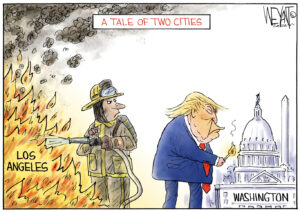Trump and the Twilight of the Postwar Transatlantic Order
The result of the U.S. election presents Europe with a critical moment of reckoning. French President Emmanuel Macron, left, speaks with Hungary's Prime Minister Viktor Orbán as he arrives for the European Political Community Summit in Budapest, Hungary, on Nov. 7, 2024. (AP Photo/Petr Josek)
French President Emmanuel Macron, left, speaks with Hungary's Prime Minister Viktor Orbán as he arrives for the European Political Community Summit in Budapest, Hungary, on Nov. 7, 2024. (AP Photo/Petr Josek)
For decades, Europe’s security and prosperity have been anchored in its junior partnership with the United States. Donald Trump’s election on an “America First” platform was a wake-up call to European leaders that Europe’s future can no longer rest solely on American assurances. After decades of reliance on Washington’s guidance and support, Europe may finally be forced to assert itself as a sovereign global power.
Polish Prime Minister Donald Tusk captured this sentiment before the election when he declared, “whatever the outcome, the era of geopolitical outsourcing is over.” French President Emmanuel Macron echoed that at the European Political Community summit in Budapest on Nov. 7, challenging Europe to take charge of its fate, asking. “Do we want to read history written by others — the wars launched by Vladimir Putin, the U.S. elections, China’s trade choices — or do we want to write our own?” Macron’s words are a rallying cry for a bold, unified and autonomous Europe, ready to shape its own agenda and destiny.
As Europe reorients itself for this new reality, the political center of gravity is shifting. Where Paris and Berlin once served as the primary interlocutors with Washington, it is now Rome and Budapest that will be the primary points of contact with the new Republican administration. Italy’s Giorgia Meloni, in particular, has fostered a strong relationship with Elon Musk, who figures to be an influential figure in the Trump administration, which could make the Italian prime minister a natural bridge between the United States and conservative Europe.
Europe may finally be forced to assert itself as a sovereign global power.
Prime Minister Viktor Orbán of Hungary, which currently holds the presidency of the European Council, will also benefit politically from Trump’s victory. Orbán’s admiration for the Republican president is no secret; he even vowed back in October to “open several bottles of champagne if Trump is back.” Yet even Orbán recognizes the importance of strengthening Europe’s strategic autonomy. Speaking at the EPC summit, he said that “the future of our [EU] ties with the United States is an unavoidable aspect of the European security architecture” but affirmed that, the EU is “going to talk about how to strengthen our strategic autonomy,” echoing the vision of Macron and Tusk.
This is not an isolationist impulse, but a realization that Europe, a continent rich in culture, resources and intellectual capital, is more than capable of managing its affairs and safeguarding its security through its values of parliamentary democracy, the social state and investment in the future.
European autonomy is essential for Europe’s economic survival in the face of an incoming U.S. administration proclaiming its intent to revive trade protectionism. Trump’s promises of higher tariffs on European goods and steep taxes on Chinese imports could send shockwaves through European industries, especially if China seeks alternative markets in Europe to offload its industrial surplus. Europe must brace itself for this, with a calculated response that balances economic stability with firm trade policies of its own.
Europe’s path forward is not without a roadmap. The September report by former European Central Bank head Mario Draghi — dubbed the Draghi report — lays out a vision for an integrated, resilient Europe and underscores the need for unity on matters of defense, economic policy and technological innovation. This is not merely about survival in a turbulent world; it’s about thriving as a self-determined, powerful bloc. The report is clear: Europe must focus its resources, coordinate policies that matter and act as a united front. For years, Europe’s strength has been fragmented by national interests, but the Draghi report calls for a bold commitment to European priorities. “We could do much more if all these things were done as if we acted as a community, but we lack focus on key priorities,” it states. “We don’t combine our resources to generate scale. And we do not coordinate the policies that matter.” Joint borrowing to fund investments in energy, transportation, research and new technologies on a European scale represents the future of the continent if it is to shape its own path forward.
The drive for economic independence dovetails with another pressing issue: climate change. With global supply chains responsible for a large share of carbon emissions, Europe has an opportunity to lead the world in the energy transition. As the United States withdraws from its climate commitments, Europe stands poised to fill that leadership void.
Transatlantic trade between Europe and the United States significantly contributes to global carbon emissions, primarily through transportation. Maritime shipping, which handles the majority of transatlantic cargo, is responsible for approximately 2.89% of global CO₂ emissions. Air freight, though less prevalent, has a higher carbon intensity per ton-mile, further adding to the environmental impact.
Europe has already spearheaded efforts to mitigate these emissions through the implementation of the European Union’s Carbon Border Adjustment Mechanism, which aims to address carbon leakage by imposing a carbon price on imports of certain goods, thereby encouraging cleaner industrial production practices globally. Reindustrializing Europe and manufacturing more products domestically is the next step in this venture.
Europe has an opportunity to lead the world in the energy transition.
The COP summit, which opened Nov. 11 in Baku, Azerbaijan, is a chance for Europe to stand out as a committed leader in the green transition, not just for Europe’s sake, but for the planet’s. Macron, German Chancellor Olaf Scholz and European Commission President Ursula von der Leyen need to immediately reverse course on their decision not to attend COP29 and make an appearance. This is more than an environmental choice — it is a choice for stability, long-term economic prosperity and responsibility.
Europe, free from the influence of an administration that dismisses climate urgency, can respond with ambition. By reducing reliance on transatlantic trade and building local supply chains, Europe can both bolster its economic independence and reduce its carbon footprint, setting a standard for sustainable development worldwide.
In an era of shifting alliances, Europe’s unity is essential to its survival. Trump’s influence poses a challenge not only to Europe’s economic stability but also to its longstanding alliances, particularly NATO. While Congress has made it harder for the United States to withdraw from NATO, Trump’s control of the Senate and House could reshape the alliance, leaving Europe vulnerable. French 2027 presidential candidate and current Democratic Socialist MEP Raphaël Glucksmann has stressed the need for a Europe that can defend itself, one whose future is decided not by Trump or Putin but by the will of its own people. However, he has also been candid about the fact that currently, “we are not ready. After two and a half years of war, the European continent is not capable of delivering to Ukraine a third of the ammunition delivered by North Korea alone.”
With Trump’s election, Europe must not simply react but recalibrate. The continent could emerge unified, resilient and ambitious — an autonomous, forward-facing power focused on sovereignty, stability and sustainability. The question is not whether Europe can stand on its own legs, but whether it will seize this opportunity and move forward with a renewed sense of purpose.
Your support is crucial…With an uncertain future and a new administration casting doubt on press freedoms, the danger is clear: The truth is at risk.
Now is the time to give. Your tax-deductible support allows us to dig deeper, delivering fearless investigative reporting and analysis that exposes what’s really happening — without compromise.
Stand with our courageous journalists. Donate today to protect a free press, uphold democracy and unearth untold stories.






You need to be a supporter to comment.
There are currently no responses to this article.
Be the first to respond.